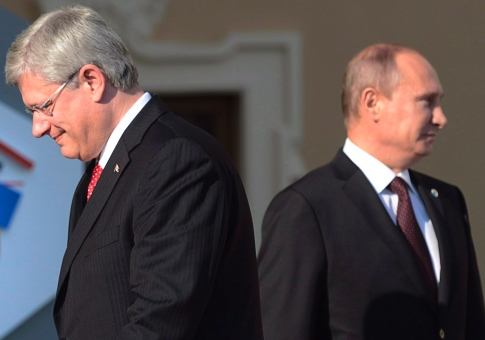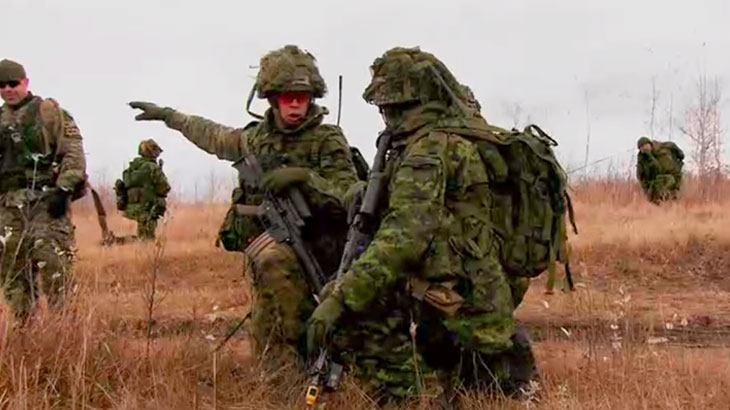The situation in eastern Ukraine has been analyzed from multiple perspectives: the EU’s relationship with Russia; NATO’s role in the Ukraine; the expansion of NATO in the face of continued Russian expansion; and the potential economic fallout of Western sanctions against Russia, to name a few. Canada, however, has another border to worry about: the Arctic. The same border that was the greatest source of North American vulnerability during the Cold War has resurfaced as a potentially threatened region by both Russian expansionism and melting polar ice. This article seeks to explain the gravity of the situation in Canada’s North and how Canada’s claims to parts of the Arctic may be threatened by the Canadian response to Russian actions in Ukraine.

Although global warming itself is still disputed amongst members of the scientific community, there is proof that the Arctic is warming. The melting sea-ice may create year-round shipping lanes, as well as allow increased access to natural resources. The current UN Convention on the Law of the Sea (UNCLOS) has not formally determined which states have rights to these shipping lanes, or to the resources. Although
international law states that a state’s territory extends for 200 nautical miles off the coast, the continual melting and freezing of the arctic passages has made it impossible to measure this distance based on land mass. As a result, states with a potential claim have been asked to submit their Arctic claim based on the extension of the continental shelf on which the state rests. These claims are intended to be scientific, yet there is much deliberation on accuracy. Furthermore, overlapping claims will need to be evaluated and decided upon by a UNCLOS tribunal, which will create additional tension amongst the member states.
Both Canada and Russia have, as of December 2013, submitted their updated, partial claims regarding the Arctic. Both submissions emphasize that they remain incomplete. It is likely that the submissions will not be completed, or become public, for many more years. In the interim, it is becoming increasingly possible for states to stake claims in other ways: the Russian expedition to plant a flag at the north pole and increased Canadian sovereignty patrols are both such examples. Both states, as well as others that have made claims, have increased their respective demonstrations of sovereignty, and will continue to do so as the arctic becomes more accessible.
However, demonstrations of sovereignty, as well as the final verdict of UNCLOS are bound by the applicability of international law: if one side chooses to discount the findings of UNCLOS, then the entire exercise is moot.
As Russia has shown in previous engagements in Georgia, and now Ukraine, international law can be set aside for the furthering of political objectives. The Arctic is certainly important to Russia, as it has continued to militarize in the Arctic, and has recently begun construction on a new Arctic base on Wrangel Island. As a result, it is entirely feasible that Russia will not have any qualms about asserting sovereignty through force of arms in the North.
Canada is prepared for military operations in the Arctic, however should Canada be required to forcefully defend its sovereignty in the north, particularly against a Russian aggressor, it would likely fail. As a result, it is necessary that Canada seek to avoid military action in the Arctic.
A logical first step in this direction would be to refrain from provoking Russia. However, as the Ukraine situation has shown, Canadian policy makers are willing to provoke Russia insofar as it concerns the Ukrainian vote – remember, that Canada has the largest Ukrainian population outside of Ukraine, an important voting block for the upcoming federal election. As a result of this willingness, Canada has continued to expand sanctions against Russia for the purpose of sending a message regarding Ukraine.
Although Russia has consistently repeated that the situation in Ukraine will not affect its policy in the Arctic, it is not this simple. What occurs between two states in one arena must have an impact on what occurs between the same two states in another arena: there is no separation of politics from politics.

The question therefore becomes, what is Canada’s priority, and what is Canada willing to do to protect this priority? Although it would be convenient to be tough on Russia in Ukraine and then expect parity in the Arctic, this is not a feasible expectation. Nonetheless, Canada must balance its commitments to NATO and NATO’s decisions regarding the Ukrainian conflict, with national interests. Canada’s response to Russian actions in Ukraine will likely have an influence on its ability to successfully negotiate with Russia regarding territories and maintenance of sovereignty in the Arctic region.
Alternatively, if Canada does not support the Ukraine as an ally against Russia, Canada will quickly lose the favour of its own allies. The result may be that, should Canada find itself embroiled in conflict over the Arctic with Russia, its allies would be unwilling to provide assistance.
It is, therefore, absolutely necessary that Canada be cautious in its approach to the situation in the Ukraine, keeping in mind that any decision will have important impacts on its relationship with Russia in the Arctic.



